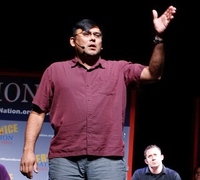What Can You Do With A Degree In The Humanities?
When Steve Jobs introduced the latest iPhone last June, he made a statement that points straight to the value of the liberal arts—and especially the humanities— in the 21st century.
“We’re not just a tech company,” said Jobs, “even though we invent some of the highest technology products in the industry. It’s the marriage of that plus the humanities or the liberal arts that distinguishes Apple.
” We would agree with Jobs that entrepreneurial, innovative thinking is exactly the kind fostered by an education that emphasizes not only the mastery of specific subject matter but also the ability to synthesize ideas, analyze alternatives and effectively express and support a line of reasoning. As scholar Dan Edelstein stated in a recent issue of Liberal Education magazine, “The entire reward system of the humanities . . . favors those students who either make a convincing case for an unusual argument, or an unusual case for a convincing argument.”
As the pace of technological change—and societal change at large—continues to accelerate, intellectual flexibility and resourcefulness will only increase in value. Many young people will enter careers that did not exist when they were undergraduates. Others will carve out career paths that uniquely express their interests and abilities.
Below are snapshot profiles of several CAS alumni who have forged their own way with a degree in the humanities.
Click here to tell us your own story — How has a liberal arts education influenced your own personal or professional path?
Secret Agent Man
James Angell ’81
BA English
As an undergraduate, the study of literature and anthropology suffused James Angell with a wanderlust that took him from New Zealand and Europe to Southeast Asia.
“It was as if the learning process never stopped when I traveled,” he said. “I would go to famous archaeological sites like Angkor Wat, and just delve into the culture, the history and language of wherever I went.”
Although Angell long assumed he’d become a professor, his love for travel eventually led to becoming “sidetracked” by a government career abroad.
He works for the U.S. State Department as a diplomatic security officer in Frankfurt, Germany, where he runs an office of about 50 American employees with top-secret clearances.
“I’m basically entrusted with the secure delivery of classified materials to U.S. embassies and consulates in some 100 different countries,” he explained.
He’s been stationed in Germany for two years. Since joining the Foreign Service in 1993, he and his family have also lived in South Korea and Bangkok, Thailand.
At the UO, Angell majored in English, focusing on American and Russian literature, but initially found work as an archaeologist in the Bay Area after graduation.
He finished a master’s degree in English at San Francisco State and planned to continue on with a doctorate. But he was looking for better pay and some extra passport stamps and decided to apply for the Foreign Service.
Though he’s lived and worked abroad for several years, his interest in literature hasn’t subsided. His writing has appeared in several publications, including Foreign Service Journal, and he sated his academic appetite by teaching composition and 100-level English for the University of Maryland’s University College in Bangkok
“I’ve always toyed with going back and teaching in the states,” he said. “But I’m happy with the path I’ve chosen and the places it’s taken me.”
A Life Worth Living
Skye Fitzgerald ’97
MFA, Theater Arts
When Portland filmmaker Skye Fitzgerald learned of impoverished Cambodians risking their lives to dismantle bombs so they could sell the leftovers to scrap-metal dealers, he knew he couldn’t stand by silently.
In 2005, he founded SpinFilm (www.spinfilm.org) to help raise awareness—and hopefully influence public opinion—for human rights issues such as this.
“I find I am often motivated by individuals and specific, concrete injustices,” he said.
After securing a Fulbright grant to study these Cambodian “village munitions harvesters,” he produced the documentary,Bombhunters. The U.S. Department of State has credited the film with influencing legislation in Cambodia that has led to a 50 percent drop in munitions harvester casualties. While shooting the film, Fitzgerald met a Cambodian woman who was publicly attacked by a group of men who doused her with nitric acid, leaving her permanently disfigured. Her story inspired Fitzgerald to produce the award-winning documentary, Finding Face. The film has enhanced awareness about the increasing prevalence of violent acid attacks.
Fitzgerald’s latest project, Peace Commandos, traces the efforts of organizations that work to disarm militant societies. The documentary focuses on the Democratic Republic of Congo, where 4.5 million people have died within the last ten years as a result of armed conflict. According to Fitzgerald, it is one of the most underreported humanitarian crises in the world.
Fitzgerald is fond of quoting a mentor’s observation: “A liberal arts education is not designed to learn how to make a living, but how to make a life worth living.” “Seeing how I have helped positively influence others’ lives through filmmaking is my ultimate reward,” he said.
Did Not Plan to Be a Planner
Shanda Pettibone ’02
BA, English
The saying, “everything’s bigger in Texas,” rings particularly true for Shanda Pettibone.
At 32, Pettibone is already at the top of her game as a pro sports event planner in the Lone Star State, having built a fast-rising career coordinating large-scale events. Currently, she’s working on the 25th anniversary “Taste of the NFL” fundraiser for the 2011 Super Bowl.
But this was not a career that was on her radar in college. “It is the ultimate irony for someone who plans events: that the one area I didn’t plan for has become my life’s work,” she said.
Having grown up in a sports family— her father is Jerry Pettibone, former head football coach at Oregon State University—sports have always been an integral part of her life. In fact, Shanda was recruited by the University of Oklahoma to play soccer before a career-ending injury. After transferring to the UO, her passion for literature and writing led her to the English department.
“Knowing how to communicate effectively through the written word is the lynchpin for everything I do,” she said.
Her responsibilities range from booking events to coordinating all logistical elements (budgeting, staging, security) to cultivating local and national media. She has planned events for the Dallas Cowboys, San Antonio Spurs and Denver Broncos, as well as the 2008 Men’s Senior Open and concerts for the likes of AC/DC and Miley Cyrus.
“I credit the UO for encouraging me to think outside the box, for challenging me to do my utmost every day and for believing that it really doesn’t ever rain in Autzen Stadium,” she said.
Cracking the Code
Holly Rasmussen ’88
BA, Romance Languages and Political Science
Sometimes the word “grammar” can elicit not-so-fond memories of diagramming sentences in high school English class.
But for Holly Rasmussen, who has gone from studying Spanish and French at the UO to working as a software engineer, grammar is key to understanding not only natural languages, but artificial ones, too.
“Natural and artificial languages are much more similar than many people realize,” she said. Both have units of meaning and rules for manipulating and arranging those units to achieve a communications goal.
But it has hardly been a straight-forward path from one language domain to the next. Like many humanities graduates, Rasmussen is a “lifelong learner” whose professional and academic career has taken many unforeseen turns.
After graduating from the UO, she began graduate work in political science at Portland State University (PSU). During this time, she began working at a law firm, where she became fascinated by the power of computers and the Internet.
So she shifted her graduate studies, “returning to my roots in languages from my studies at the UO,” she said. “Only this time I studied artificial languages.”
She earned an MS in computer science at PSU, by which time she was working at Intel, which led to her current position at US Bank. Professionally, she develops software for ATMs; on the side, she develops iPhone and iPad applications for children.
The most important skills she honed at the UO were analytical thinking and the ability to consider alternatives— both of which she credits with helping her “think outside the box” in terms of career options.
Lessons from Russia
Greg Sautter, ’93
BA, Russian
As an assistant city attorney in Minneapolis, Greg Sautter defends and sues on behalf of his city on a wide range of cases. But to do so, he has to understand his city. And as Minneapolis’s population grows increasingly diverse, this requires an ability to connect with people from other cultures.
Sautter developed that knack, he says, as an undergraduate when he studied abroad in Russia. He later went to law school at Georgetown, but his experiences as an ex-pat remain seared in his mind.
“When you’re in a society that isn’t yours, you develop an empathy and understanding for what’s foreign around you in your own society,” he said.
In 1992, Sautter, who was also a cadet in the UO’s Army ROTC program, studied abroad at St. Petersburg State University where he bunked in a dorm with a Russian veteran who had fought in the Soviet war in Afghanistan. Sautter learned from his new friend about the traumatic experiences many Russian soldiers suffered, including abuse at the hands of their comrades, whose hazing of younger soldiers was often violent and cruel.
Fascinated by these stories, Sautter eventually focused his Honors College thesis on the experience of Soviet-Afghan war veterans, analyzing the folk songs and poetry the soldiers shared with each other.
Spurred by his Russian experience, Sautter continued to travel abroad during his military career, working as an Army judge advocate in Korea, Germany and Kosovo. He traveled to Kosovo to defend soldiers who’d been accused of crimes, but found himself one of the few Americans able to connect with the Serbs, who could understand his Russian.
“NATO had just kicked them out of their homeland, so they were suspicious of Americans,” he said. “It was neat to gain their trust. It was those kind of experiences that have influenced me ever since.”
Profiles by Anne Conaway and Marc Dadigan




 Learn how experts across disciplines are together advancing green chemistry.
Learn how experts across disciplines are together advancing green chemistry.